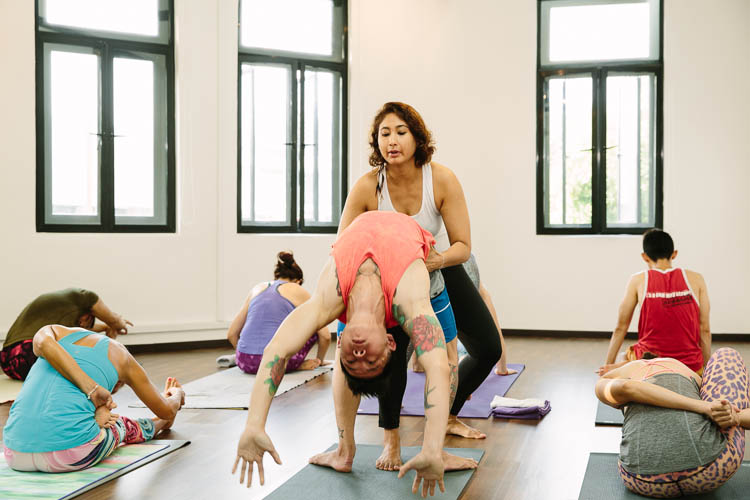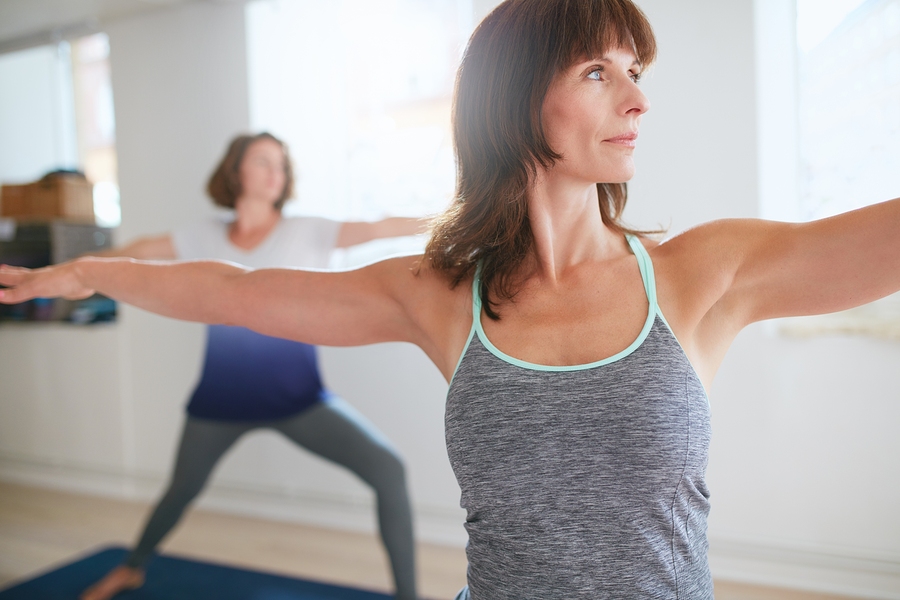Yoga has so many mental and physical health benefits, it is hard to actually count and keep track of.
Since any form of exercise is beneficial for one’s mental and physical health, the majority of individuals today rely exclusively on cardiovascular/aerobic activities, while throwing to the wayside yoga/meditation or other forms of diaphragmatic breathing designed to have a powerful effect on your body and mind. In case you need a gentle reminder and a little motivation, let us review the myriad health benefits of yoga that are designed to keep you feeling well both physically and mentally as you age well into your golden years.
- Supercharges your brain. As little as 25-30 minutes of yoga increases your memory, attention span, focus and helps you process information more accurately and quickly.
- Soothes stress. Practicing yoga can have immediate psychological effects. Among these are cultivating a sense of calm, and decreasing anxiety and stress. Over time, these positive mental benefits occur even when you are in your kitchen cooking a meal, and off your mat!
- Improving flexibility. In a few studies to date, yoga increased people’s flexibility by up to 35 percent after only 7-8 weeks of practice.
- Increases balance. Certain poses enhance balance, and in older individuals specifically can actually reduce the number of falls they have, and reduce their fear of falling.
- Fends off weight gain. Those who practice yoga regularly gain less weight as they age than do those who don’t practice.
- Boosts body confidence and image. Women who practiced yoga on a regular basis rated their body satisfaction higher, regardless of current weight, than those who pursued other forms of exercise.
- Relieves headaches. Yoga reduces the frequency and intensity of various headaches, including migraines, and tension headaches.
- Reduces depression. Studies show that yoga can lesson symptoms of depression, like feeling lethargic and overall fatigue. One reason may be yoga’s boost to GABA, a neurotransmitter that is often low in people who are depressed.
- Protects your heart. Yoga, when practiced consistently reduces blood pressure, lowers level of harmful LDL cholesterol by almost 12 points, and lost an average of 5 pounds.
- Promotes more zzz’s. This is really great news for insomniacs. After 2 months of practicing yoga for 45 minutes before bed, students fell asleep 15-18 minutes faster, and had more quality REM sounding sleep leading to more than a half hour longer each night in deep sleep than controls.
- Lessons inflammation. I have written about chronic inflammation in the past that is linked with a whole host of health issues from diabetes, depression, obesity, and high blood pressure to name a few. In regular yoga practice, yoga tends to lower levels of cytokines-as immune system protein associated with this.
- Slows aging. With yoga therapy and yoga based stretching, scientists have discovered it may lengthen telomeres-the end caps of chromosomes that affect aging, and that consequently shorten every year we age.
- Controls diabetes. Men and women with type 2 diabetes who practiced yoga for 5-6 months saw a substantial decrease in their blood glucose levels, a recent new study found.
- Encourages Exercise. Inactive people enrolled in some form of yoga for a minimum of 8 weeks found that this markedly increased the chances they would partake in other physical activities. This is largely due to the release of dopamine, serotonin, and endorphins all flooding your body.
- Improves your day, and your mood. Various studies over the last 10 years have shown that yoga lowers stress including workplace stress, and promotes general well being. This zen disposition is not only visible on the outside, but the transformation is taking place from within, which contributes to a longer lasting positive effect on your health.
The list goes on and on, and this is far from an exhaustive list. It might be tempting to skip yoga as part of your exercise routine, and to shave off some time for yourself, but given all the health benefits, it might be wise to continue using it in your exercise regimen if you already incorporate it, or reconsider doing yoga alongside your aerobic activities to improve your overall mental and physical health and well being. It is important to remember that yoga is not about how much you weigh or how flexible you are, and that there are various forms of yoga suitable for different interests. As trite as the old adage sounds, when it comes to yoga, it really is never too late to start no matter your age. So get rollin!
From: PsychCentral



